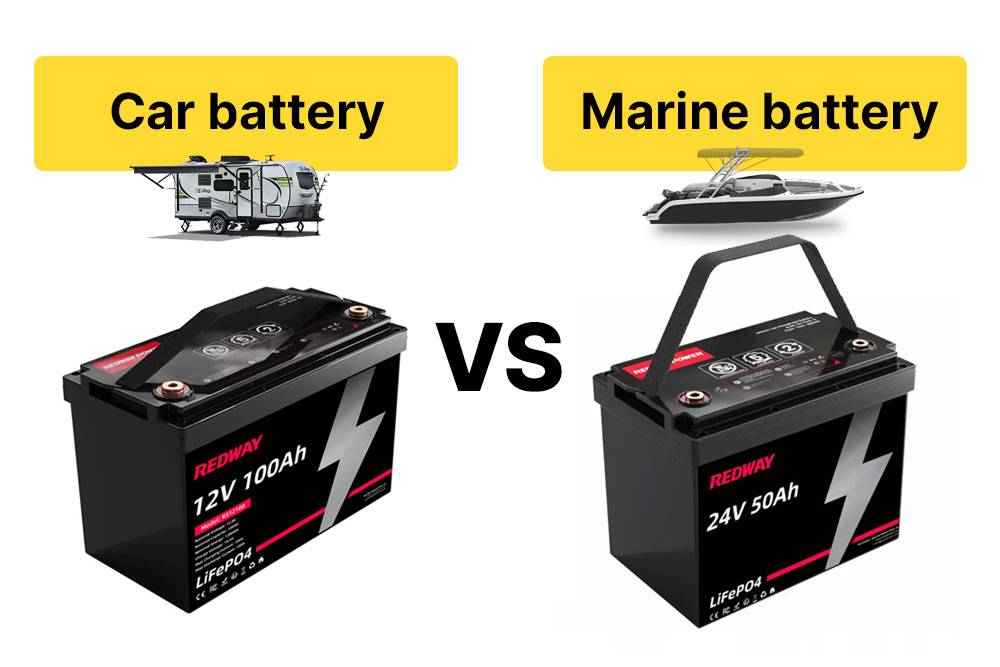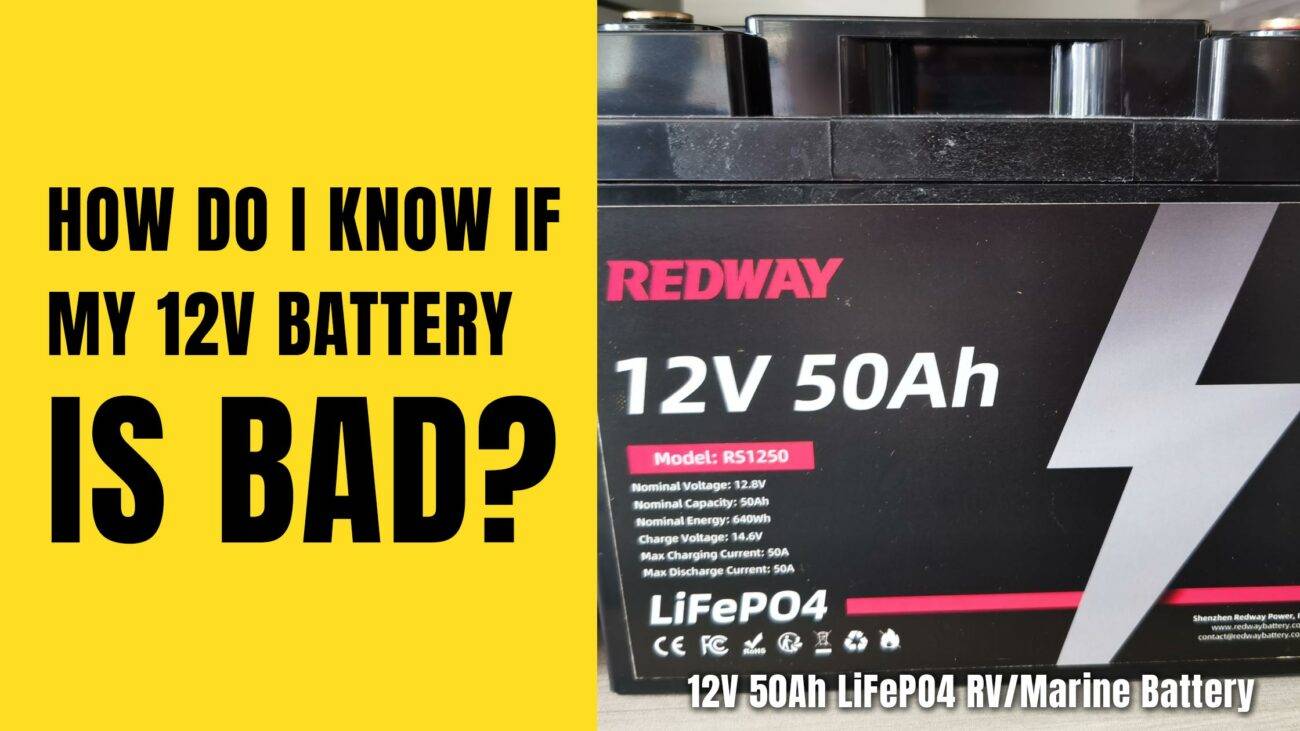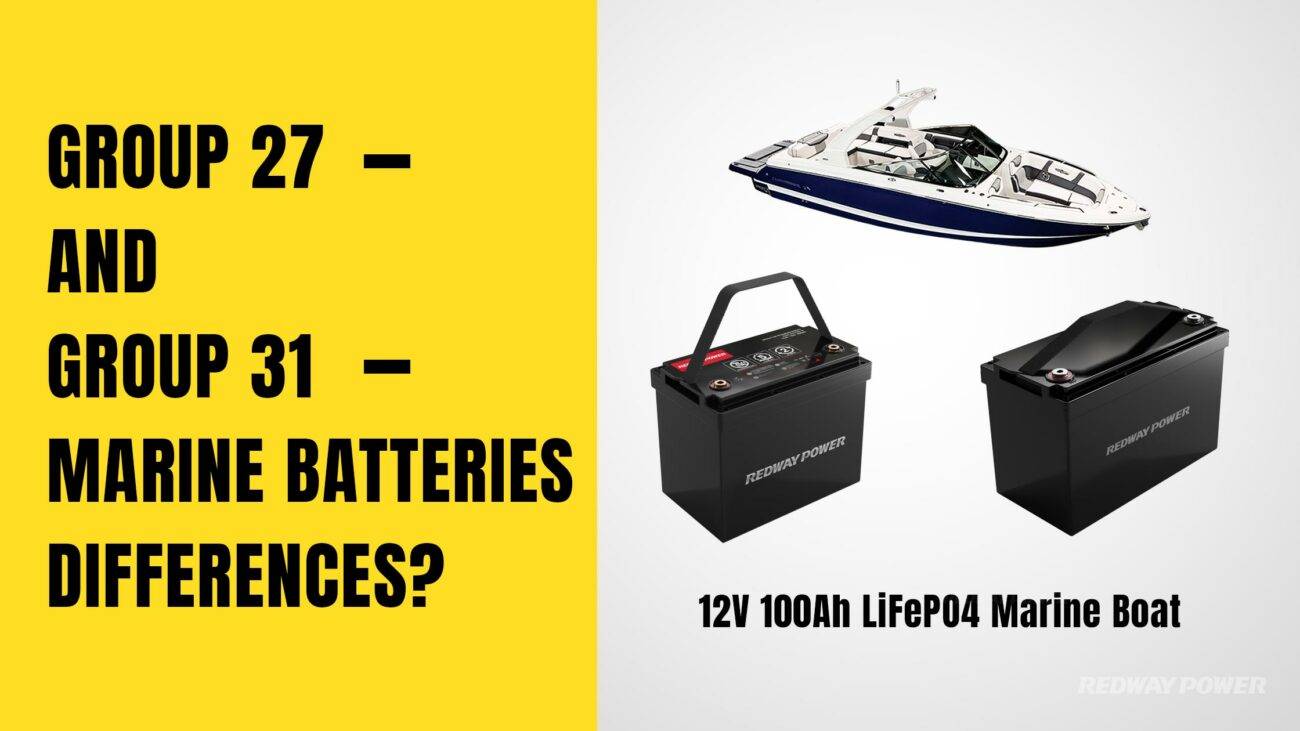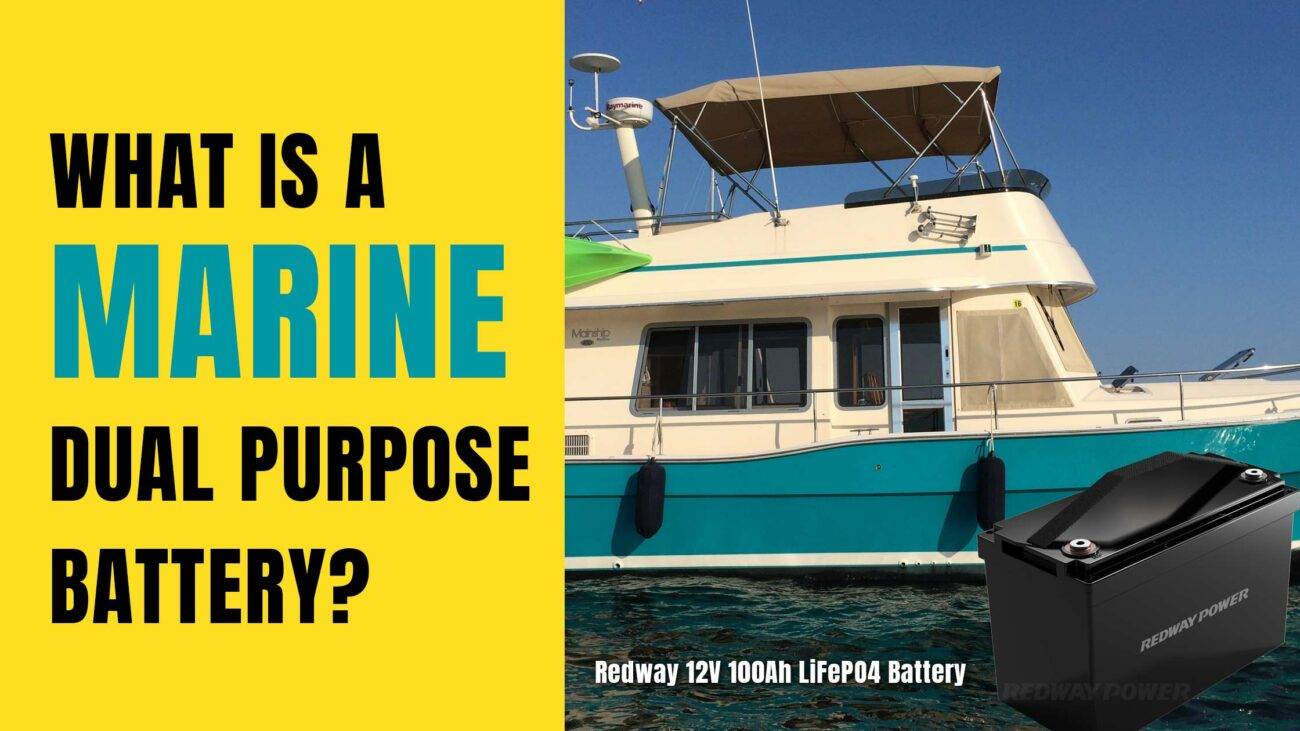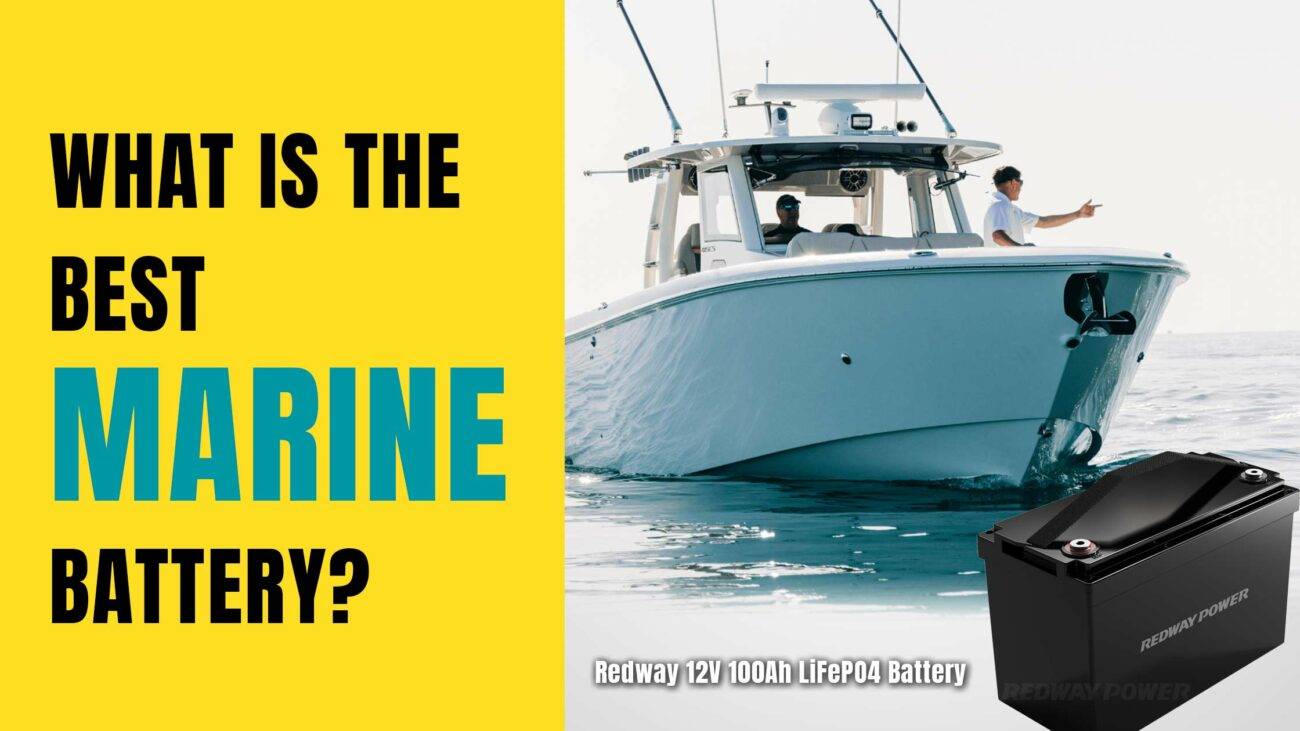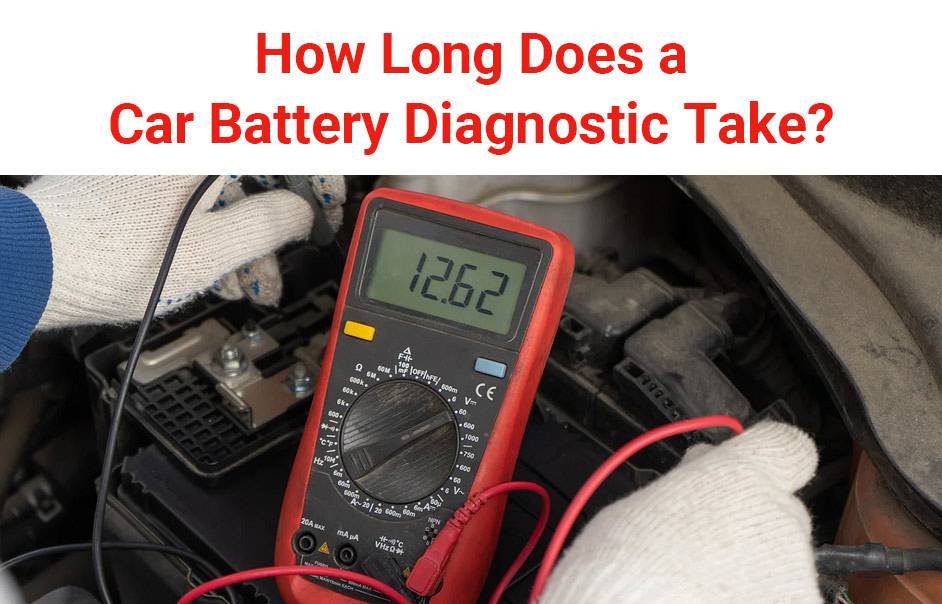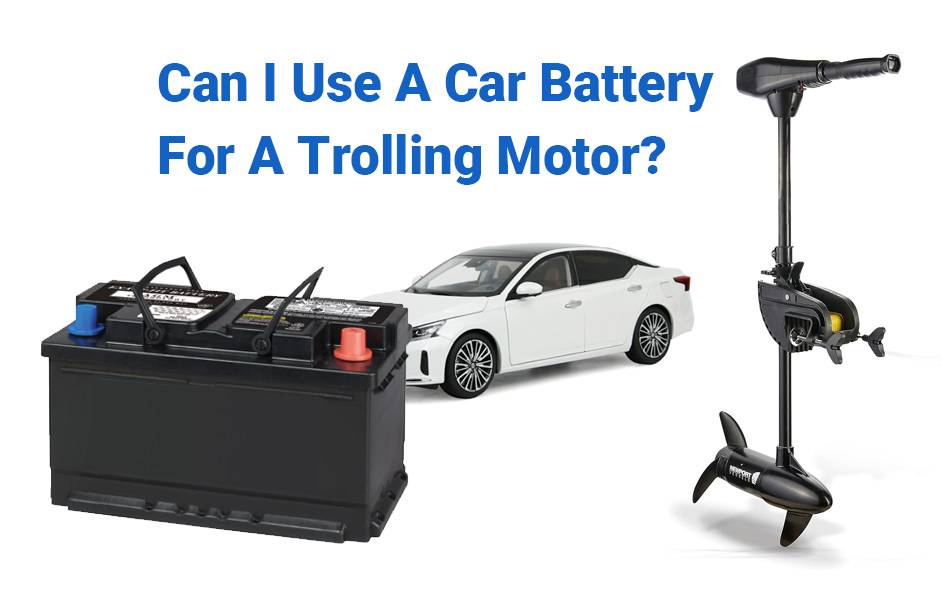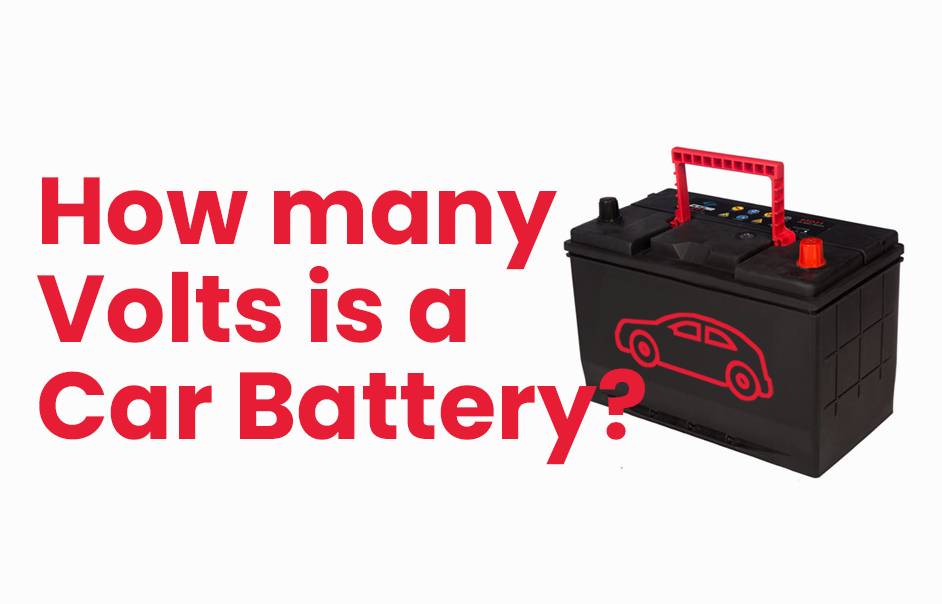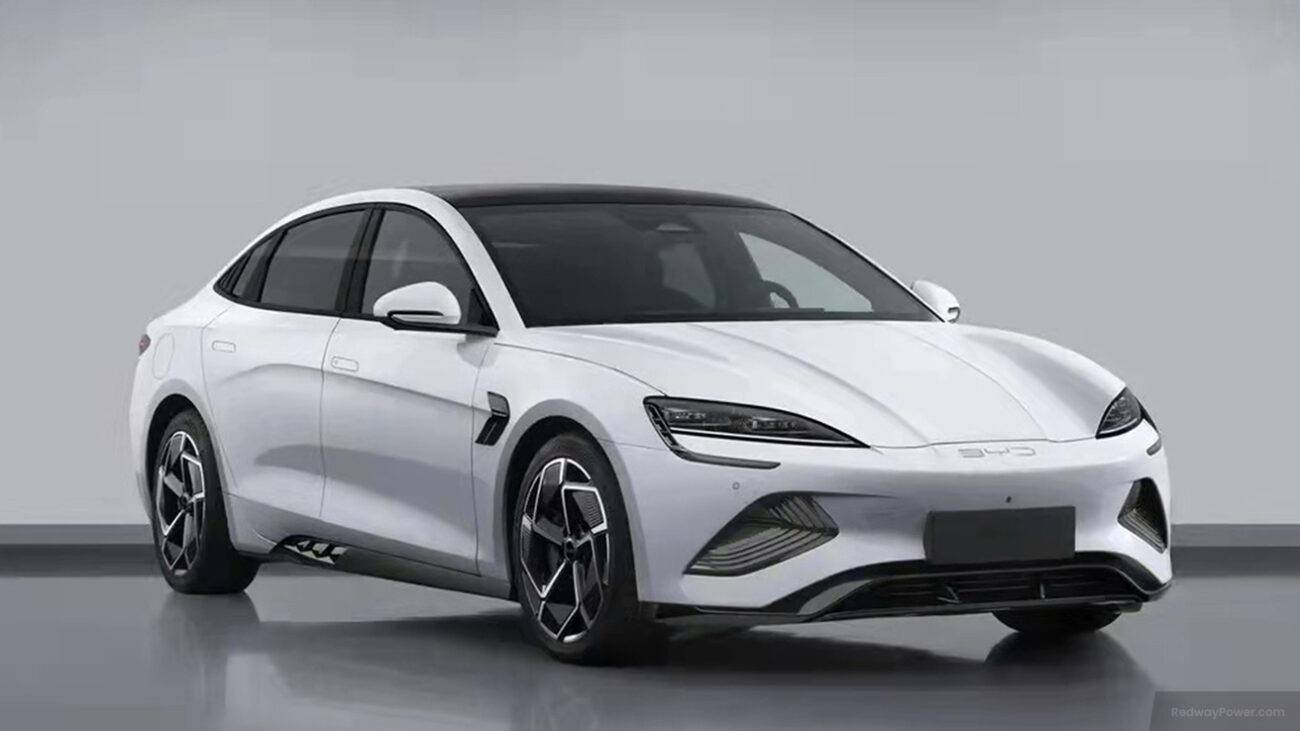Before using a car battery as a marine battery for your boat, understand the crucial differences. Delve into factors like performance impact and maintenance. Explore key considerations when choosing between marine and car batteries for your vessel. Ensure you make an informed decision to optimize your boating experience.
What is Car Battery?
Car battery is vital for powering a vehicle’s electrical system, facilitating engine startup and electronics operation. Typically utilizing lead-acid technology, they contain sulfuric acid and distilled water. They provide short bursts of high energy to start the engine, recharging while driving. Capacity is measured in ampere-hours (Ah), indicating its duration of power provision. Issues starting or electronic malfunctions may signal battery problems, necessitating maintenance. Regular monitoring ensures peak performance.
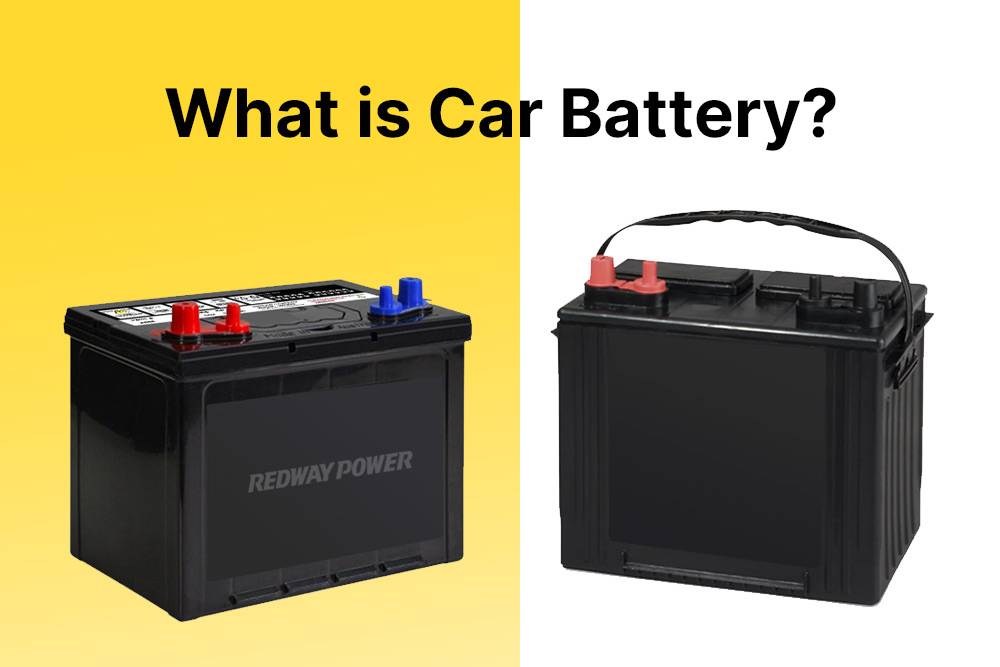
What is Marine Battery?
Marine battery is tailored for marine vessels, enduring rough waters and constant motion. They encompass starting, deep-cycle, and dual-purpose types, catering to engine ignition and accessory power. Constructed with corrosion-resistant materials, they withstand water and salt exposure. Marine batteries boast higher cold-cranking amps (CCA) than car batteries, ensuring reliable performance in challenging marine environments.
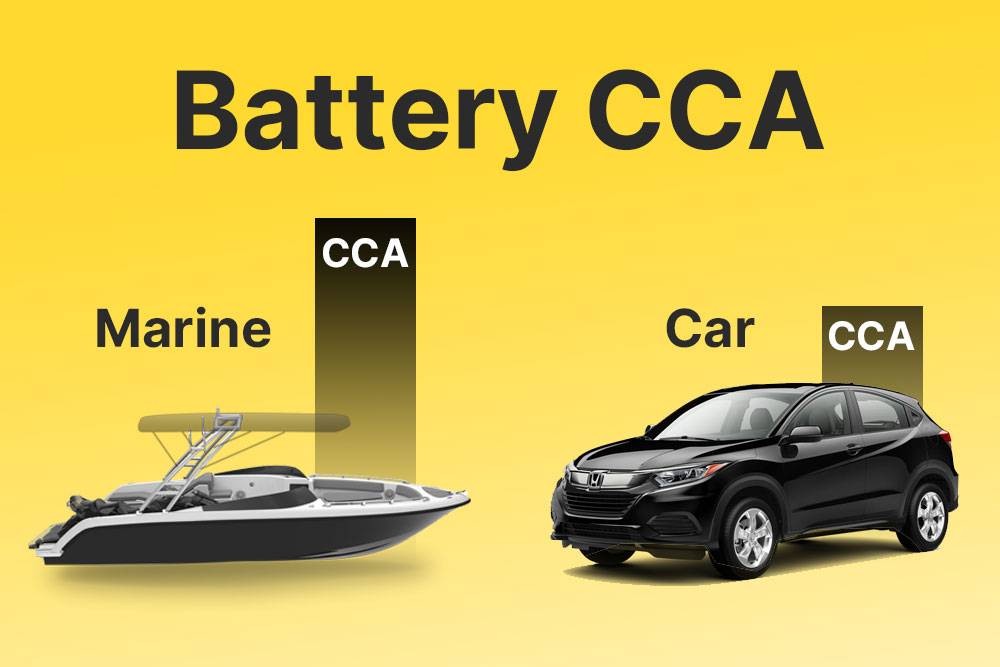
What makes a marine battery unique?
Marine batteries are specifically designed for boats and have unique features. They are vibration-resistant, deep-cycle batteries that provide reliable power for onboard equipment. Some marine batteries are dual-purpose, combining starting power with deep-cycle capabilities. They are sealed and maintenance-free, resistant to corrosion, and offer sufficient cold cranking amps for reliable engine starting. Choosing the right marine battery depends on specific needs, whether it’s for starting, deep cycling, or both.
What are the different types of marine batteries available in the market?
There are four main types of marine batteries available in the market: flooded lead acid batteries, absorbed glass mat (AGM) batteries, lithium batteries (LiFePO4), and gel batteries. Flooded batteries require maintenance, AGM batteries are maintenance-free and popular, lithium batteries have a long lifespan and consistent discharge, and gel batteries offer deep cycling capabilities. Choose the type based on your specific needs and boat requirements.
Difference between Car Batteries and Marine Batteries
Car batteries and marine batteries serve distinct purposes despite their similar appearance. While car batteries provide quick energy bursts for engine starting, marine batteries deliver sustained power for longer periods on water. Understanding their differences is crucial when considering their interchangeability.
- Car batteries have thinner plates, optimized for quick bursts of energy, while marine batteries feature thicker plates to withstand continuous charging and discharging cycles in rough marine conditions.
- Marine batteries are equipped with higher electrolyte levels to prevent spillage during boat movement, whereas car batteries can handle lower electrolyte levels due to their stationary nature.
- Car batteries measure power output in starting (cranking) amps, while marine batteries rely on deep-cycle amps for consistent power delivery during extended trips on the water.
In conclusion, while car batteries and marine batteries may look alike, their construction, electrolyte levels, and power measurement methods differ significantly. Understanding these distinctions is vital for choosing the right battery for specific applications.
Can a Car Battery be Used as a Marine Battery?
Using a car battery as a marine battery may seem tempting, but it’s not ideal due to their different purposes and construction. Car batteries provide short bursts of power for engine starting, while marine batteries offer sustained power for boat accessories. Marine batteries are specifically designed to withstand marine conditions, unlike car batteries.
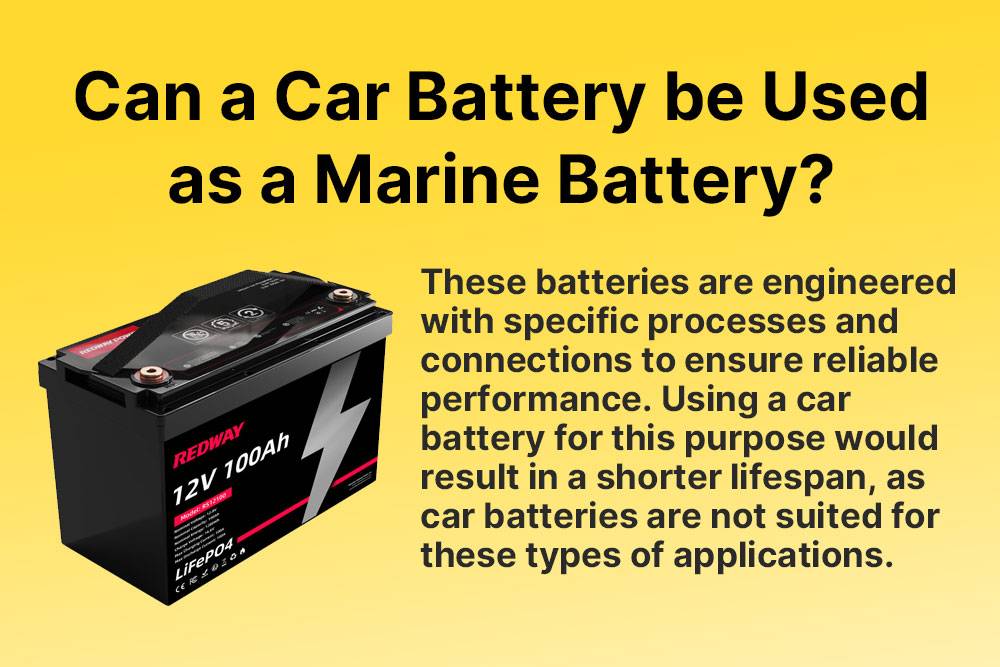
When selecting a battery for your boat, consider factors like capacity, reserve capacity, and cold-cranking amps to meet boating requirements. Proper maintenance, including regular inspection, cleaning, and storage, is crucial to extend the lifespan of your marine battery and ensure safety on the water.
It’s recommended to invest in a dedicated marine battery rather than using a car battery. Choosing the right battery ensures reliable performance for all your boating activities, providing peace of mind during your aquatic adventures.
Can a marine battery charger be used for car battery charging?
Yes, you can use a marine battery charger to charge a car battery, but there are considerations. Ensure the charger’s voltage is compatible with the car battery (usually 12V), adjust the charging rate if needed, and follow safety precautions. However, using a dedicated car battery charger is generally more efficient for car batteries.
Key Factors to Consider When Choosing a Marine Battery
Choosing the right marine battery for your boat requires considering several key factors:
- Size and Power Requirements: Assess the energy needs of your vessel to ensure the battery can meet the demands of your specific watercraft.
- Battery Technology: Decide between lead-acid, AGM, or lithium-ion batteries, considering their performance, maintenance, and cost implications.
- Durability and Reliability: Opt for a battery designed to withstand harsh marine conditions, including moisture and vibrations, ensuring long-lasting performance.
- Deep-Cycle Capability: If using electronic devices onboard for extended periods, choose a battery with deep-cycle capability for a consistent power supply without frequent engine starts.
- Safety Features: Prioritize batteries with spark resistance and leak-proof designs for enhanced safety and peace of mind while on the water.
Considering these factors will help you select the most suitable marine battery for your boat, ensuring reliable performance and safety during your voyages.
How do Marine Batteries compare to RV Batteries?
Marine batteries and RV batteries have distinct purposes and characteristics. Marine batteries are designed for boating and offer deep cycling capabilities, while RV batteries serve various applications in recreational vehicles. Marine batteries prioritize power for onboard equipment, while RV batteries balance energy storage for appliances and starting. Both types vary in capacity, maintenance needs, durability, and cost. Choose the battery type based on your specific needs and application.
The Importance of Matching the Right Battery to Your Boat
Choosing the right battery for your boat is essential for performance and safety. Marine batteries are designed to withstand marine conditions, unlike car batteries, which can fail prematurely and pose safety risks. Consider factors like boat size, electrical requirements, and usage frequency when selecting a marine battery to ensure it meets your power needs. Investing in a quality marine battery ensures reliable power and enhances your boating experience, making it a worthwhile long-term investment.
Tips for Properly Maintaining Your Marine Battery
Proper maintenance is key to maximizing the lifespan and performance of your marine battery:
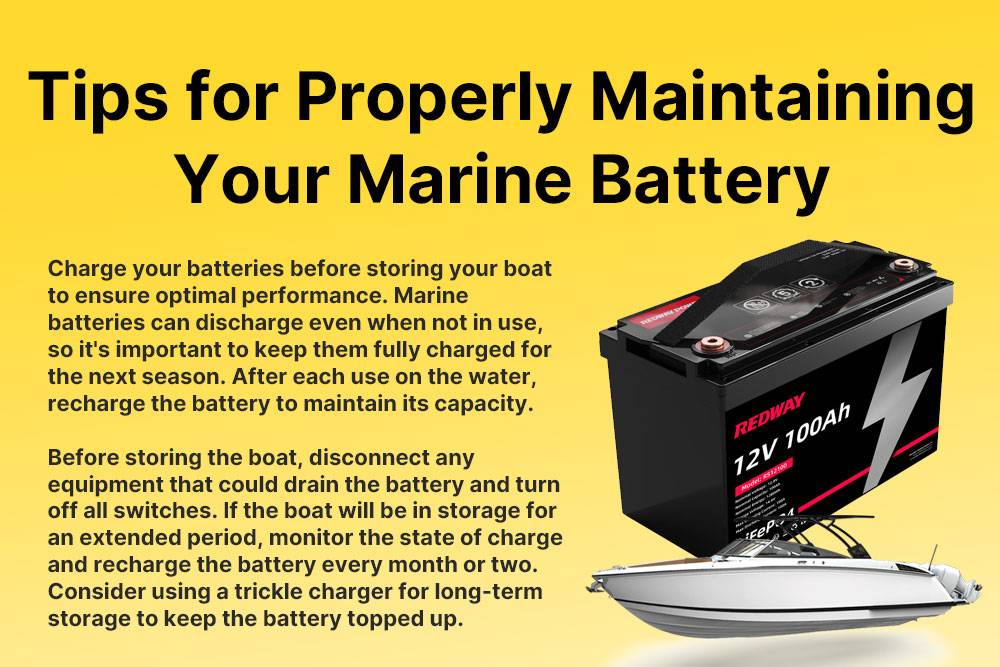
- Regular Inspection: Check for corrosion or leaks and clean terminals with a baking soda-water solution to prevent buildup.
- Charging: Keep the battery charged when not in use using a trickle charger or by disconnecting it from the boat’s electrical system to prevent sulfation.
- Electrolyte Levels: Monitor and top off electrolyte levels with distilled water as needed to ensure optimal performance.
- Storage: Store the battery in a cool, dry place away from extreme temperatures and direct sunlight to prolong its lifespan.
Following manufacturer recommendations for maintenance and usage guidelines will help preserve your marine battery investment for years to come.
Alternatives to Using a Car Battery on a Boat
When powering your boat, choosing the right battery is vital for a smooth and safe experience on the water. While a car battery may seem convenient, it’s not suited for marine use. Investing in a marine battery designed for boats is essential for optimal performance and safety.
Consider alternative power sources like deep-cycle, dual-purpose, and AGM batteries, each offering unique advantages based on your needs. Proper maintenance and selecting the appropriate battery type will enhance your boat’s electrical system’s longevity and efficiency, ensuring peace of mind on every voyage. Choose wisely – the right battery can greatly impact your boating adventures.
FAQs
Are lithium-ion batteries considered dangerous and what precautions should be taken?
Lithium-ion batteries are commonly used in devices like cellphones and laptops, but they can be dangerous if mishandled. To ensure safety, purchase batteries from recognized sources, avoid overcharging, inspect for damage before use, store them away from extreme temperatures, and seek professional help in emergencies. These precautions help minimize the risks associated with lithium-ion batteries.
Which type of battery is recommended for a trolling motor to last the longest?
The best battery choice for a trolling motor to maximize longevity depends on your priorities. Options include the Optima OPT 8016 Deep Cycle Marine Battery, known for its vibration resistance and recharging capabilities. Lithium Iron Phosphate (LiFePO4) batteries offer lightweight and long-lasting performance, but at a higher cost. The Bass Pro Shops Power Series Deep Cycle AGM Marine Battery is a versatile and affordable option. Prioritize your needs when selecting a battery.
What are the advantages of lithium batteries compared to traditional lead-acid batteries?
Lithium-ion batteries offer several advantages over traditional lead-acid batteries. They are more energy-efficient (95% vs. 80-85%), have a longer lifespan (10-15 years vs. 3-12 years), and are smaller and lighter. Lithium-ion batteries require no maintenance and have a lower environmental impact due to their lack of toxic lead content. These advantages make lithium-ion technology superior for solar systems and other applications.
What are the drawbacks of deep cycle lithium batteries, particularly in terms of upfront costs and amperage output?
Deep cycle lithium batteries offer advantages over traditional lead-acid batteries, but there are some drawbacks. They have a higher upfront cost compared to lead-acid options. Extreme temperatures can affect their performance, and safety concerns like thermal runaway exist. However, their longevity and efficiency make them appealing for specific applications. It’s important to consider the initial investment, temperature sensitivity, and safety precautions when opting for deep cycle lithium batteries.
What is a battery management system (BMS) and how does it benefit lithium batteries?
A Battery Management System (BMS) is essential for lithium-ion batteries. It monitors battery health, voltage, current, and temperature. The BMS ensures safety by preventing overcharging, over-discharging, and thermal issues. It also balances the charge distribution among cells, enabling efficient and reliable battery performance.
How can Marine Batteries be distinguished by their chemical composition?
Marine batteries can be distinguished by their chemical composition. Common types include flooded lead-acid (FLA) batteries, which require regular maintenance and have lead plates submerged in sulfuric acid. Absorbent Glass Mat (AGM) batteries are maintenance-free, spill-proof, and have AGM separators. Lithium Iron Phosphate (LiFePO4) batteries are lightweight, long-lasting, and utilize lithium-ion technology. Consider factors like weight, maintenance requirements, and cost when choosing a marine battery based on its chemical composition.
What are the battery requirements for living-on-board vessels like houseboats, sailboats, and catamarans?
Living-on-board vessels like houseboats, sailboats, and catamarans have specific battery requirements. Consider energy demand, battery type (lead-acid or lithium-ion), capacity, charging system, and battery management system. Tailor your battery choice based on vessel size, usage, and budget for reliable power supply on board.
What are the applications and limitations of using a marine battery in a car?
While marine batteries can be used in cars if they meet voltage and size requirements, it’s important to consider compatibility and limitations. Marine batteries offer advantages such as resilience to extreme weather and deep-cycle capabilities for high-electrical-demand vehicles. However, they tend to cost more than regular car batteries, and long-term use is not recommended due to design differences and intended purposes.
How do marine batteries perform in comparison to regular batteries?
Marine batteries and regular car batteries have different designs and performance characteristics. Marine batteries are designed for boats, prioritizing deep cycling and consistent power for onboard equipment. Regular car batteries are designed for engine starting. Marine batteries can handle deeper discharges and store more energy for accessories, while car batteries focus on engine starting. Maintenance requirements and durability also differ. Choose the appropriate battery based on your specific needs.
What are the considerations when using a marine battery in a car?
When using a marine battery in a car, consider compatibility, advantages, and limitations. Ensure voltage, size, and terminal fitment match. Marine batteries offer resilience in extreme conditions and deep-cycle capabilities. However, they may have higher costs and may not be suitable for long-term use in cars. Choose wisely based on your specific needs.
Is it possible to charge a car battery using a marine charger?
Yes, you can charge a car battery using a marine charger. Ensure the charger’s output voltage matches the car battery’s requirements (usually 12V) and adjust the charging rate if needed. Follow proper connections and safety precautions. However, using a dedicated car battery charger is usually more efficient for car batteries.
What types of marine batteries are available based on their chemical composition?
Marine batteries come in different types based on their chemical composition. The main ones include flooded lead-acid (FLA), absorbed glass mat (AGM), gel batteries, and lithium-ion batteries. FLA batteries are traditional and require maintenance, while AGM and gel batteries are spill-proof and maintenance-free. Lithium-ion batteries are lightweight and long-lasting. Choose the type that suits your needs and priorities.
What are the key features of marine starting batteries and marine deep cycle batteries?
Marine starting batteries are designed to reliably start boat engines, with higher cranking amps and reserve capacity for onboard electronics. They have a heavy-duty construction and vibration resistance. On the other hand, marine deep cycle batteries provide steady power over an extended period, allow deep discharge, and are suitable for running appliances. Some models have a long lifespan and may require maintenance. Choose the right type based on your boating needs.
How do marine batteries handle vibrations and harsh conditions on the water?
Marine batteries are designed to handle vibrations and harsh conditions on the water. They have reinforced components to resist engine vibrations, coated terminals for protection against saltwater exposure, and are built to withstand marine environments. Choose marine batteries for reliable performance in challenging marine conditions.

